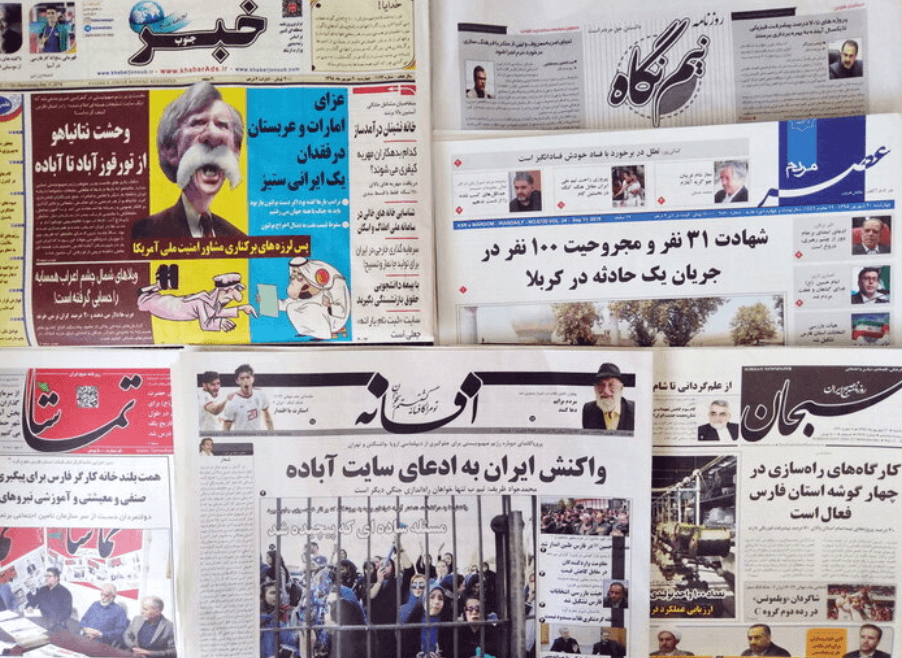The Abadeh site: What Iranians are saying about Netanyahu’s revelations
By John Krzyzaniak | September 17, 2019
 A sampling of front pages from newspapers in Shiraz on Wednesday, September 11, 2019.
A sampling of front pages from newspapers in Shiraz on Wednesday, September 11, 2019.
Back in April 2018, Israeli Prime Minister Benjamin Netanyahu announced that Israeli spies had conducted an overnight raid on a facility in the outskirts of Tehran and had stolen a trove of secret documents on Iran’s nuclear program. Then, a few months later, in a speech at the UN General Assembly, he claimed the existence of a “secret atomic warehouse” just down the road from the first site.
Now, nearly one full year after his UN speech and about a week before the Israeli parliamentary election, Netanyahu has revealed what he calls “yet another secret nuclear site” in Iran, this one near Abadeh, in Fars province. The prime minister claimed the Iranians destroyed the site earlier this year after finding out that the Israelis had discovered it.
How have the Iranians responded to his accusations?
Shortly after Netanyahu’s statement, Javad Zarif, Iran’s foreign minister, wrote in a tweet that “the possessor of real nukes cries wolf,” deflecting the criticism without substantively addressing the prime minister’s claim.
The Iranian newspapers followed suit. Donya-ye Eqtesaad, an economics-focused daily, ran an article with the headline, “Iran’s response to Netanyahu’s absurd claims,” that approvingly quotes Seyed Hossein Mousavian, former Iranian ambassador and currently a research scholar at Princeton, as saying, “The time has arrived for [the Israeli prime minister] to stop lying.”
Almost every story in the Iranian press highlights the Israeli elections as context for the prime minister’s remarks. An analysis on the government’s official news website begins by asserting that when an election is coming, sometimes Netanyahu “promises to annex parts of the West Bank” and sometimes he “shows off maps and images about Iran’s nuclear activities in front of the cameras.” An analysis in Mehr uses similar language, adding that “the closer we get to the elections, the more Netanyahu makes controversial and unrealistic promises in order to attract votes.”
Several news stories also suggested that Netanyahu may be worried that the United States is letting up on its maximum pressure campaign of sanctions on Iran. The front page of Afsaneh, a newspaper published in Shiraz, called the prime minister’s statement “another propaganda” event to head off any possibility of diplomacy between Europe, Washington, and Tehran.
A few analyses went beyond speculation about Netanyahu’s motivations, however, and took the Abadeh claims more seriously. Writing for Hamshahri, Hassan Beheshtipour argues that, by the Israelis’ own admission, the documents are from 2009, so anything that may have happened at Abadeh is old news. The author also questions why, if the site were so important, Netanyahu did not reveal any details about it sooner, given that he claimed Israel learned of the site from the trove of documents it stole from Iran last year. Finally, Beheshtipour writes that if there really had been “uranium activity” at Abadeh, traces of the radioactive metal would remain and could still be detected—simply knocking down buildings would not have eliminated it.
In a lengthy report for Etemaad, Sara Masoumi draws heavily from a New York Times article, complaining that the prime minister’s press conference was short on details and reporters were not allowed to ask questions. Like Beheshtipour, she wonders why the Israelis had never mentioned the site before, and why they withheld the information when Netanyahu invited reporters from the New York Times, the Wall Street Journal, and the Washington Post to review documents in the stolen archive last summer. Finally, echoing Zarif’s tweet, Masoumi reminds readers that Israel, not Iran, is the country with nuclear weapons. Israel, she writes, has no room to complain about lenient IAEA inspectors when Israel itself does not allow international inspections and is not a member of the NPT.
Publication Name: Hamshahri (Persian)
To read what we're reading, click here
Together, we make the world safer.
The Bulletin elevates expert voices above the noise. But as an independent nonprofit organization, our operations depend on the support of readers like you. Help us continue to deliver quality journalism that holds leaders accountable. Your support of our work at any level is important. In return, we promise our coverage will be understandable, influential, vigilant, solution-oriented, and fair-minded. Together we can make a difference.
Keywords: Abadeh, Israel election
Topics: Nuclear Risk, What We’re Reading














